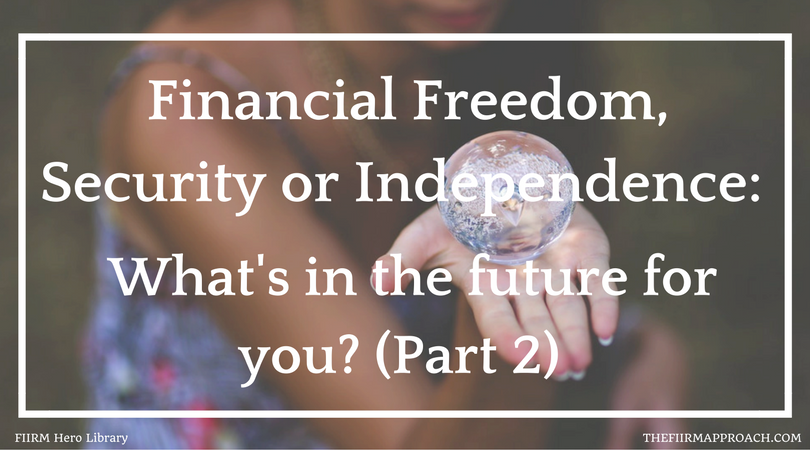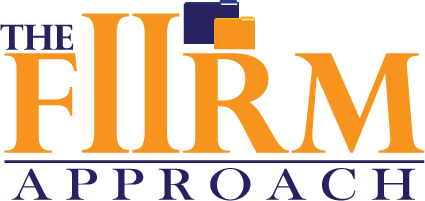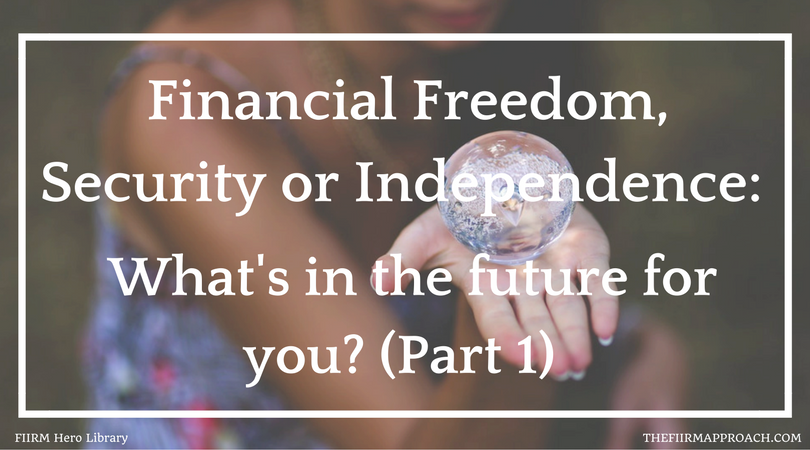
What’s in your financial future? Security, Freedom or Independence (Part 2)
What’s in your financial future? Security, Freedom or Independence (Part 2)
Welcome back from Part 1.
Let’s talk Independence!
Que Beyonce and the girls!
Or Jamie Foxx and Ne-Yo (I like that version too)
Imagine your standard of living being independent of your decision to work a job.
Imagine your ability to earn money not being dependent on the efforts of your spouse, significant other or parent.
Remember the term independently wealthy? I don’t hear very often today, but it sounded super fancy when I was a kid. Independent AND wealthy for $1,000 Alex!
Well, financial independence is not quite the same thing.
While independently wealthy individuals are also financially independent…financially independent individuals are not always independently wealthy.
The little difference is the wealth factor.
So, how do you become financially independent?
Financial independence is like being “grown” on another level. You are not dependent on a spouse, a family member, friend or a paycheck to take care of your needs. Ultimately, you are not dependant on one source of income.
You’ve figured out how to use a combination of your investments, savings and other passive income streams to your advantage.
This is difficult to even initiate if you aren’t financially secure and almost impossible without being financially engaged.
While financial independence may give you the feeling of freedom, it’s different from financial freedom.
Financial independence is more about the “how” of your ability to generate income versus the “what.”
You’ll see why shortly.
What impacts your ability to have financial independence?
Many would say a job! While that may true, I would argue that the biggest impairment is only having one stream of income.
If being independent is about being in control, having only one source of income spits in the face of financial independence.
There’s a much higher probability, risk, and impact to you if you lose your one and only source of income versus losing 1 of many.
So what impacts your ability to achieve financial independence…I’m sure you can guess the 1st one…
-having one source of income
-being primarily dependent on another individual’s income
-having more expenses than income (aka living outside your means)
-purchasing large amounts of material possessions with no monetary value
Financial Freedom
The definition of freedom previously referred to the freedom of caring or having constraints.
When you don’t care about something it’s typically because it doesn’t affect you.
Ironically, being free is kind of like being a kid.
Only in this instance, you have more power!
The moment you don’t care about how much money you have is likely when you don’t need it.
Ummm, what?
Did you just ask me, who doesn’t care about money?
Well, it’s typically those that:
- Live well below their means (2) Have more means than they will ever truly need
Financial Freedom gives you even more options! The option to be who you want to be, do what you want to do and give your time to the things you truly care about.
Financial Freedom is commonly associated with having a LOT of money. I’m not suggesting that it isn’t a way to obtain financial freedom, but what I suggesting is that it is NOT THE ONLY WAY.
Option 1: Your standard of living is independent of your ability to earn money. You have built a life that looks like you subscribe to “tiny living” or a nomadic lifestyle.
You only need true essentials to survive and may be much more concerned with experiences versus stuff.
Option 2: You leverage your tushy off (which is not the same as working your tushy off). Under this scenario, your ability to earn money is not being dependent on your individual efforts.
You leverage your resources, your network, and your assets to generate enough money so you are not confined by the traditional means of earning a living.
When your goal is financial freedom, a higher emphasis is placed on lifestyle and choices versus just dollars in the bank.

What does financial freedom look like to you?
This could be the lifestyle of the rich and famous or the lifestyle of Gandhi or Mother Teresa but the bottom line is that it’s the lifestyle that you choose!
Your income may come from a variety of sources including, but limited to wages from a job, your business, interest income, dividends, business interests, royalties, etc.
Imagine not caring about money or your ability to cover your obligations. Imagine having no constraints when it comes to your life’s choices.
Imagine having the power, the means and the choice to do what you want, help who you want and live how you want.
You have created a life that gives you the freedom to do so.
While I know financial freedom to be a “popular answer” to a common question, being free is not for everyone. It requires commitment and sacrifices whether you pick Option 1 or Option 2.
What impacts your ability to have financial freedom?
-Tons of debt
-No money
-Lack of discipline
-Trying to do it all alone
-Mental Constraints
You hear about famous people traveling the world and living in “MTV cribs-style homes”. In the same year, you hear about their millions in back taxes or bankruptcy which implies that they were living beyond their means and thus are not truly financially free.
You also hear about people that have never had credit card debt (or any debt), live in an Amazon jungle and volunteer to help those less fortunate (by Western standards).
While this person may or may not have enough money to outlive them, they have made the choice to be free of the constraints of what most deem as a “normal life.” This is what financial freedom looks like to them.
You can’t gain either of these three statuses by accident. They all require discipline, commitment, patience and usually help from others.
The statuses shouldn’t be viewed as stair steps. While you may start with financial security you have the option to structure your life to go straight to financial freedom!
As you are considering which one of these 3 ideas connects with you the most, I recommend asking yourself these basic questions?
- What do you truly value in life?
- What is preventing you from reaching financial security, financial independence or financial freedom?
- Are the decisions you’re making beneficial or detrimental to your goals?
While progress starts with financial security, it’s up to you what level you hit next.
Take me with you along for the ride as you begin to take action towards real progress and accomplishing your financial goals! Grab your free copy of the FIIRM Ultimate Resource Guide. Learn what other women like you are doing to save more, do less and earn more.

Nikki Tucker
Founder & Managing Director
Nikki is a 16-year financial services professional, a Certified Divorce Financial Analyst ®, and the primary divorce financial strategist for The FIIRM Approach. She helps female breadwinners prepare for divorce to avoid common financial mistakes and confidently maintain their financial security. She uses proven strategies within the FIIRM Approach methodology so her clients can manage their money, debt, and credit in their new financial life. TAKE ACTION & LEARN about the tools that can help make your new money life easier. Grab your FREE Ultimate Resource Guide HERE.






 Yep, before you got married you may have had an engagement party to celebrate the possibility of getting married. You celebrate the progress you’ve made in a romantic relationship.
Yep, before you got married you may have had an engagement party to celebrate the possibility of getting married. You celebrate the progress you’ve made in a romantic relationship.
Recent Comments